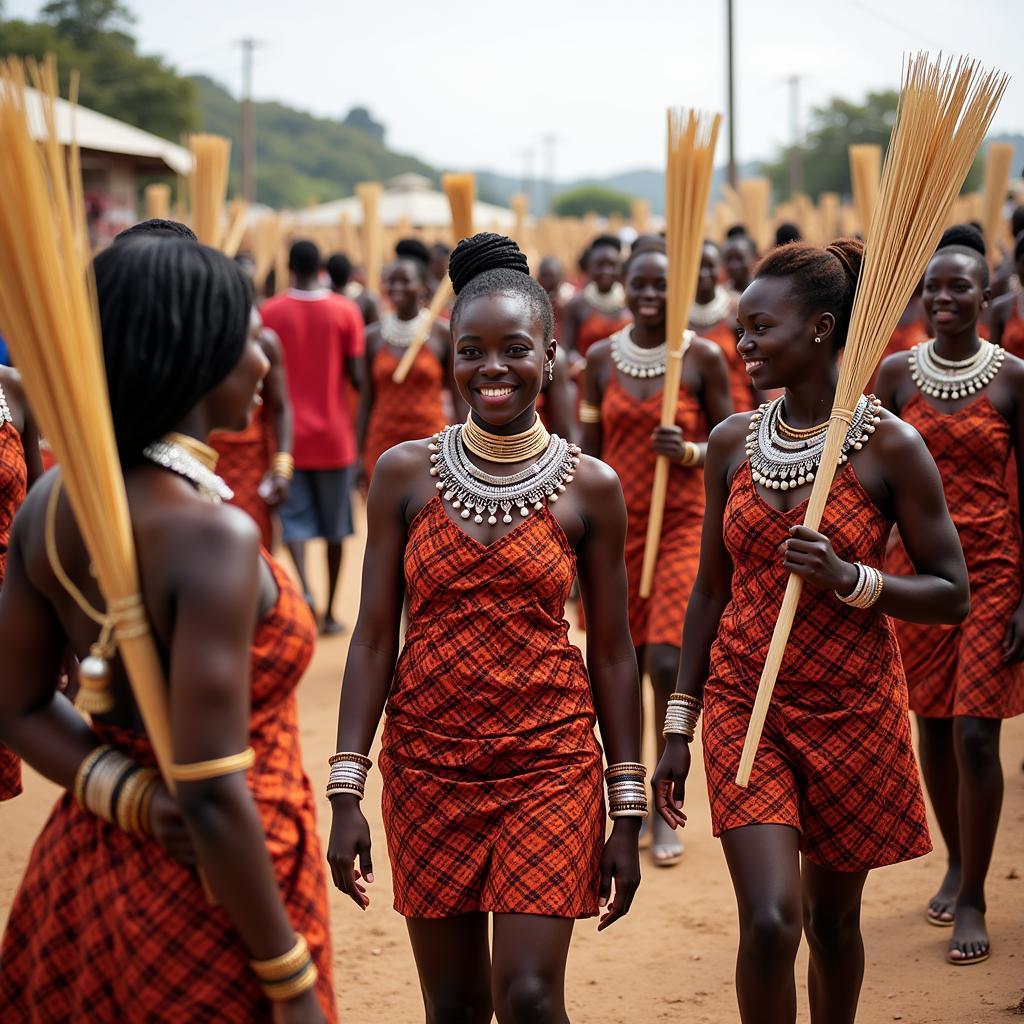Exploring African Country Thanksgiving Traditions
Thanksgiving, a time for gratitude and celebration, isn’t just a North American holiday. While not called “Thanksgiving” in the same way, many African countries have long-held harvest festivals and ceremonies deeply rooted in gratitude for a bountiful earth. These celebrations offer a fascinating glimpse into the diverse cultures and traditions across the continent, reflecting a deep connection to the land and the importance of community. These African Country Thanksgiving celebrations are often marked by feasts, music, dance, and rituals, offering a unique perspective on giving thanks.
Harvest Festivals Across the Continent: A Celebration of Gratitude
Across Africa, numerous cultures observe harvest festivals, although they may not be directly equivalent to the North American Thanksgiving. These celebrations often center around the first fruits of the harvest, giving thanks for the sustenance provided by the land. From the yam festivals in West Africa to the Umhlanga ceremony in Eswatini, these events are vibrant expressions of community and gratitude. They’re a testament to the resilience and resourcefulness of African communities, celebrating the hard work and blessings of the harvest season.
In many West African countries, yam is a staple crop and holds significant cultural importance. Yam festivals are a time to give thanks for a successful harvest and pray for continued prosperity. These celebrations are typically marked by feasting, dancing, and traditional rituals, showcasing the rich cultural heritage of the region.
Further south, in countries like Zambia and Zimbabwe, ceremonies focus on thanking the ancestors for their blessings and protection over the harvest. These ceremonies often involve traditional dances, music, and storytelling, passed down through generations. The emphasis on ancestral reverence highlights the importance of lineage and the interconnectedness of past, present, and future generations.
Umhlanga: A Unique Thanksgiving in Eswatini
The Umhlanga, or Reed Dance, in Eswatini is a unique celebration of womanhood and a form of thanksgiving for the harvest. Thousands of young women participate in this vibrant ceremony, presenting reeds to the Queen Mother as a symbol of respect and unity. The Umhlanga is not only a visually stunning spectacle but also a powerful expression of cultural identity and a celebration of the nation’s heritage. It’s a powerful example of an African country thanksgiving tradition.
 Eswatini Reed Dance (Umhlanga) Ceremony
Eswatini Reed Dance (Umhlanga) Ceremony
How do African Harvest Festivals Differ from North American Thanksgiving?
While both African harvest festivals and North American Thanksgiving share the common thread of gratitude, they differ significantly in their historical context and cultural expressions. North American Thanksgiving is rooted in the pilgrim narrative, while African harvest festivals are often linked to ancient agricultural traditions and spiritual beliefs specific to each region. The focus in African ceremonies is often on community, ancestral reverence, and the cyclical nature of life and the seasons.
What are some common foods eaten during African harvest festivals?
The foods enjoyed during African harvest festivals vary greatly depending on the region and the specific crops celebrated. Yams, maize, sorghum, millet, and various fruits and vegetables are common staples. Dishes are often prepared using traditional methods, passed down through generations. The feasts are not just about nourishment but also a symbolic representation of the abundance provided by the land.
african american museum thanksgiving
The Importance of Community and Sharing
A central theme in African country thanksgiving traditions is the importance of community and sharing. Harvest festivals are a time for people to come together, celebrate their collective efforts, and reaffirm their social bonds. The sharing of food and resources reinforces the values of reciprocity and interdependence, strengthening the fabric of the community. These celebrations are a vibrant reminder of the interconnectedness of life and the importance of supporting one another.
How are African harvest festivals evolving in modern times?
As with all traditions, African harvest festivals are evolving in modern times, adapting to changing social and economic landscapes. While the core values of gratitude and community remain, some aspects of the celebrations may be modernized. However, there’s a strong emphasis on preserving the cultural significance and passing these traditions on to future generations. This ensures that these valuable celebrations continue to thrive in the 21st century and beyond.
african american museum thanksgiving
Conclusion: A Global Perspective on Gratitude
Exploring African country thanksgiving traditions offers a valuable global perspective on gratitude and celebration. These diverse ceremonies highlight the deep connection between humans and the land, demonstrating the universal human impulse to give thanks for the blessings of life. By understanding and appreciating these rich traditions, we can broaden our own understanding of thanksgiving and its many expressions around the world. Let us continue to learn from and celebrate the diverse ways in which cultures across the globe express gratitude.
FAQ
- What is the equivalent of Thanksgiving in Africa? While there isn’t a direct equivalent, many African countries celebrate harvest festivals with similar themes of gratitude.
- When are African harvest festivals typically held? They are usually held after the main harvest season, which varies depending on the region and crops.
- What are some examples of African harvest festivals? The Umhlanga in Eswatini and yam festivals in West Africa are notable examples.
- What is the significance of these festivals? They celebrate the harvest, give thanks for abundance, and reinforce community bonds.
- How can I learn more about specific African harvest festivals? Researching individual countries and their cultural traditions is a great starting point.
- Are these festivals still celebrated today? Yes, they are still celebrated, often adapting to modern contexts while retaining their core values.
- Why is it important to learn about these traditions? It broadens our understanding of cultural diversity and the different ways people express gratitude.
Need support? Contact us 24/7: Phone: +255768904061, Email: [email protected], or visit us at Mbarali DC Mawindi, Kangaga, Tanzania.


